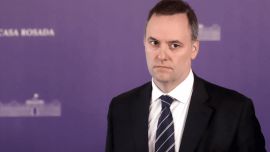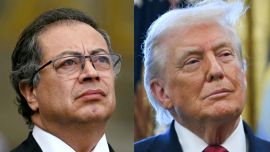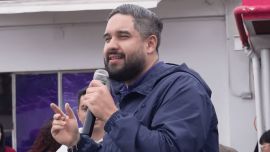President Javier Milei’s first year in office was marked by drastic state cutbacks, the sharpest rise in poverty in two decades, and an aggressive rhetoric and shift in foreign policy that drew global attention to the nation.
Here are the main events of his inaugural year:
-
Presidential victory and agenda
Milei took office on December 10, 2023, after winning a run-off election with 55 percent of the vote. His campaign centred on promises to dollarise the economy, curb inflation, and achieve fiscal balance through radical state downsizing, famously symbolised by his "chainsaw" metaphor. -
Currency devaluation and inflation battle
A 52-percent devaluation of the peso in December triggered a 25.5 percent surge in inflation. But by January, inflation had started to decline. Last month, it dropped to 2.7 percent by October, a shift Milei termed “an economic miracle.” -
Downsizing of the state
The Cabinet was reduced from 18 to 8 ministries. Eliminated departments included the Ministries of Education, Labour, Science and Technology, Environment, Culture, and Women, Gender & Diversity. Agencies addressing discrimination (INADI) and indigenous rights were also shuttered. -
Fiscal milestones
In January, Milei achieved a primary fiscal surplus (0.3 percent of GDP), Argentina’s first in over a decade. Public works contracts were halted for the entire year and over 30,000 state jobs have been cut via a combination of the non-renewal of contracts, firings and early retirements. -
Legislative battles
Despite submitting a mega-reform package containing more than 600 articles to Congress, a lack of legislative majorities forced Milei to scale back his ambitions. In June, he secured his first legislative victory with an emergency economic law granting him special powers, advancing state reform, and creating a regime to attract large investments. -
Currency controls and Dollarisation delays
While maintaining currency controls, Milei has postponed his dollarisation plans indefinitely. He introduced a tax amnesty to bolster Central Bank reserves and counter speculative attacks. The peso appreciated, but the dollar-denominated economy grew more expensive, eroding purchasing power. Everyday items have soared in price, with inflation felt in dollars. -
Market deregulation and poverty spike
Price controls on food and medicine were removed, as were regulations on rent, insurance, private education, and telecommunications. Subsidies for utilities and public transport were cut. Poverty as a result surged by 11 points, reaching 52.9 percent — the steepest rise in two decades — while consumption, manufacturing, and construction have plummeted. -
Cultural and social cuts
Funding for INADI national film institute was slashed, and the state news agency Télam was shuttered. Free cancer medication and food for community kitchens were suspended pending lengthy audits, prompting criticism from the Catholic Church and legal action after thousands of tons of food were found rotting in warehouses. -
Crime reduction
From January to August, the homicide rate in Rosario, the country’s most violent city, fell by 62 percent year-on-year. Recent threats from “narco-terrorists” against a provincial governor and the national security minister are being investigated. -
Airline Deregulation and Privatisation Push
Milei deregulated the aviation market, signed open skies agreements with nine countries, and has advocated for privatising Aerolíneas Argentinas, stating, “it will be privatised or shut down.” -
Protests and repression
A new anti-picket security protocol authorised federal forces to suppress street protests and prevent roadblocks. Clashes with protesters have been often but violence has not been deadly. -
Pensions and social benefits
A bill to raise pensions by eight percent was vetoed, citing threats to Milei’s economic plan. A compensatory bonus for minimum pensions was frozen, and free medications for retirees were scaled back. Pensioners are feeling the pinch. -
Military and transparency restrictions
Milei purchased 24 fighter jets from Denmark and classified all arms procurement operations. Public access to government information was restricted, with rejections now at the administration’s discretion. -
Education and research cuts
Milei vetoed a bill to increase university funding and reduced scientific scholarships. Massive protests have underlined the importance of state education for Argentines and the funding battle continues. -
Foreign relations
Aligning closely with the United States and Israel, Milei has travelled often and prioritised trips to right-wing summits and meetings with tech leaders like Mark Zuckerberg and Elon Musk. -
Divisive rhetoric
Throughout the year, Milei’s divisive rhetoric targeted the media, lawmakers, and opponents, with frequent slurs such as “rats,” “human excrement,” and “leftist scum.”
– TIMES/AFP





















Comments